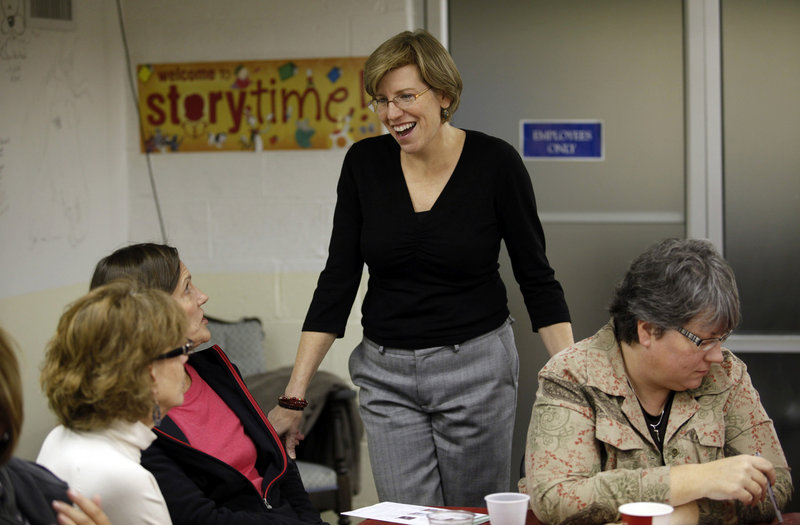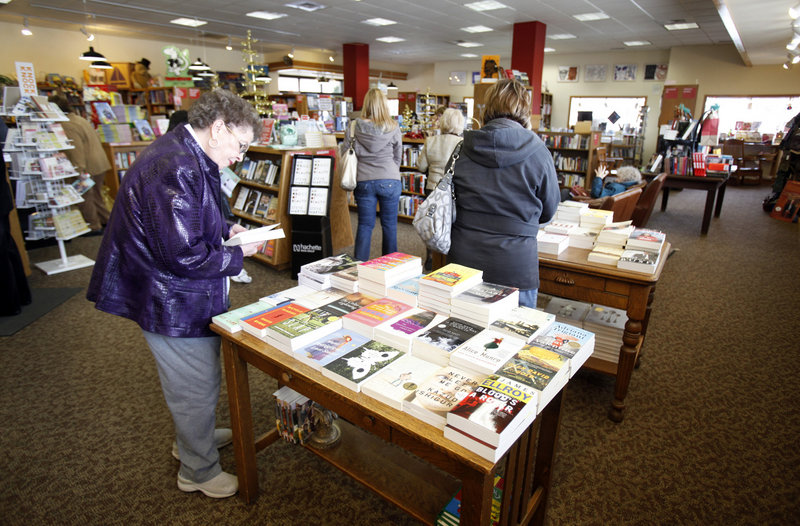WICHITA, Kan. – Watermark Books & Cafe on a midweek morning was bustling with book browsers and coffee sippers.
It’s been a surprisingly good year for the Wichita bookstore, as it has been for many independent bookstores across the nation.
Watermark owner Sarah Bagby estimates her book sales have risen 20 percent in the past 12 months compared with the prior year.
Yet bookstore owners are girding for the changes shaking the industry, with the big chains possibly consolidating, the continued growth of online booksellers, and the rapid rise of e-books.
Bagby doesn’t sound alarmed. She’s gotten better at her business, she said, and created a strong niche for the present and a strategy for the future. Even so, the future is hazy.
“The future will certainly be different,” she said. “But I don’t know how it’s going to look.”
Many independents have gone out of business over the past 20 years, first with the rise of national chains such as Barnes & Noble and Borders, then followed a few years later by Amazon.com and other online booksellers.
But the independent bookstore is not a thing of the past. In Wichita, Eighth Day Books’ owner Warren Farha saw sales rise close to 10 percent in the past 12 months. And David Lovett, owner of Wichita’s Book-a-Holic, which sells used books, estimated his sales were up 7 percent.
Independent booksellers say the e-book phenomenon hasn’t had much impact on their business — so far. That will change with the rapid growth in sales of e-readers and e-books.
Many independents have an Internet strategy, selling online and, for some, selling e-books.
But they say that, at heart, they are bricks-and-mortar stores and always will depend on the preference for words printed on a page.
“It will have an impact eventually,” Lovett said of e-books. “But I also believe both markets will compete side by side. True book lovers want the feel and smell of a bound book. E-readers don’t give you that.”
It’s hard to know whether this is a good or bad time to be an independent, given the seismic changes taking place. But several recent developments seem positive.
The big chains, which have made life miserable for the little guys over the past 20 years with their large selections, volume pricing and high-dollar locations, are hurting.
Borders, which relies heavily on selling music, was viewed as a candidate for bankruptcy earlier this year before it got an infusion of money from a private investor.
During the summer, its larger competitor, Barnes & Noble, put itself up for sale. The company has spent heavily to develop the Nook to compete with Amazon’s Kindle and Apple’s iPad, but it has been losing money.
Last week, one of Borders’ major shareholders, William Ackman of the New York-based Pershing Square Capital Management hedge fund, offered to help fund the purchase of Barnes & Noble.
His idea is to merge companies and cut costs by closing stores so it can better compete in the coming explosion of online books.
Consolidation could mean local independents face a stronger remaining competitor, but it also would mean fewer competing retail outlets, potentially giving them market share.
But, of course, the real war is moving from the street to online.
Amazon, whose Kindle initially had the e-book market to itself and was building an audience by selling them for $9.99, has essentially been forced by five of the major publishers to agree to a new pricing model in which the publishers set the prices in return for the bookseller getting 30 percent of the sales.
The result may be a level playing field for retailers. Local booksellers wouldn’t be offering a hardback for $25 while Amazon was selling the e-book for $9.99.
Just as important, when Google announced last week that it was introducing its own e-book platform, it also announced that it will cooperate with the American Booksellers Association, the trade group of independent bookstores.
This gives the small stores access to a sophisticated e-book platform.
“It’s a huge thing,” said the association’s Meg Smith. “We were counted out, and now there is an opportunity for our members to serve their customers however they want to read the book.”
Watermark’s Bagby said she expects to be able to offer e-books through her website, running Google’s platform behind the scenes, later this month.
In this new e-book market, Watermark would compete directly with all other booksellers, large and small. It’s more of a defensive move to capture sales from those who already like the store.
“It gives customers who want to shop locally a place in town to get an e-book,” she said. “A lot of the ways we compete are because we are local.”
Book-a-Holic’s Lovett said he already offers 100,000 titles through Amazon.com, eBay and other sites, and he plans to offer e-books early next year.
But Eighth Day Books’ Farh said while he markets printed books through the Web, he’s reluctant to get into e-books.
Eighth Day Books sells heavyweight books on philosophy and religion. He said reading books on a computer has its limits.
“I can’t see reading Hegel on a Kindle,” Farha said. “I can’t imagine it.”
Send questions/comments to the editors.





Success. Please wait for the page to reload. If the page does not reload within 5 seconds, please refresh the page.
Enter your email and password to access comments.
Hi, to comment on stories you must . This profile is in addition to your subscription and website login.
Already have a commenting profile? .
Invalid username/password.
Please check your email to confirm and complete your registration.
Only subscribers are eligible to post comments. Please subscribe or login first for digital access. Here’s why.
Use the form below to reset your password. When you've submitted your account email, we will send an email with a reset code.